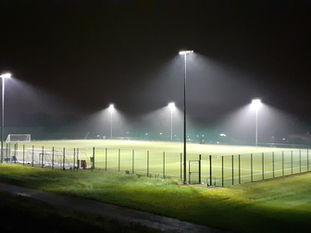
The Importance of Electrical Works for Lighting Installations
Oct 3, 2024
3 min read
0
9
0

When it comes to lighting installations, the quality and reliability of the electrical works involved are just as important as the lighting design itself. Proper electrical installation ensures that your lighting system operates safely, efficiently, and without unnecessary maintenance issues.
Whether you're installing lighting in a commercial building, sports facility, or residential space, the electrical work behind the scenes plays a crucial role in the system's overall performance.
At Midlands Lighting Solutions, we support you from concept to construction with your project, ensuring everything is perfect quality.
What Electrical Works Are Needed for Lighting Installations?
Lighting installations require several key electrical components and processes to ensure that the system is safe, functional, and long-lasting. Here are the main electrical works involved in any lighting project:
Wiring and Cabling
Proper wiring is fundamental to any lighting installation. This includes running cables from the main electrical panel to the lighting fixtures, switches, and controls. The type of wiring used depends on the location, power needs, and the size of the system. Inadequate wiring can lead to overloads, faults, or even fire hazards, so it's essential to choose the correct type and size of cable for the installation.
Switches and Controls
Effective lighting requires well-placed switches and controls. Modern lighting systems often include dimmers, motion sensors, or timers to increase energy efficiency and functionality. These components must be properly wired and integrated into the electrical system to function smoothly and provide users with flexibility in lighting control.
Earthing and Safety Systems
Proper earthing is essential for any electrical installation to prevent electric shock or fire. In lighting installations, all metal parts of the system must be earthed to safely direct any electrical faults away from users. Safety systems, including circuit breakers and residual current devices (RCDs), must also be installed to protect against overloads and short circuits.
Distribution Boards
Lighting systems are typically connected to a dedicated circuit on the distribution board (fuse box). Ensuring that the lighting circuit is correctly configured helps prevent overloading, especially in larger installations where multiple circuits may be required. Each circuit needs to be protected with the correct type of fuse or breaker to ensure safety.
Energy Efficiency Considerations
The electrical work behind lighting installations can also impact the energy efficiency of the system. The installation of energy-efficient LED lights, for example, requires careful planning in terms of power distribution and control systems. LED lights typically draw less power than traditional lighting, and the electrical design must reflect this to avoid compatibility issues.
Why Proper Electrical Installation is Essential
A well-executed electrical installation is the foundation of any successful lighting project. Here are a few reasons why getting the electrical works right is so important:
Safety
Faulty electrical installations can lead to a range of safety hazards, from electric shocks to fire risks. Ensuring that all wiring, earthing, and safety devices are correctly installed reduces the risk of accidents and creates a safer environment for everyone using the space.
System Longevity
Proper electrical works help extend the lifespan of your lighting system. Poor wiring, incorrect fuses, or badly installed components can lead to frequent breakdowns, flickering lights, or even complete system failures. A well-installed electrical system ensures the lighting works efficiently for many years with minimal maintenance.
Energy Efficiency
Modern lighting installations are designed with energy efficiency in mind, but without the right electrical work, you won’t get the full benefits. Ensuring that your lighting is installed with appropriate wiring, energy-efficient controls, and LED-compatible circuits can help reduce energy consumption and lower operational costs.
Compliance with Regulations
Electrical installations in the UK must adhere to strict safety regulations, such as the British Standard BS 7671 (IET Wiring Regulations). A professional installation ensures compliance with these regulations, protecting both the property owner and the installer from potential legal issues and ensuring the system passes any required inspections.
Electrical works are a critical component of any lighting installation. From wiring and earthing to controls and distribution boards, each element must be carefully planned and executed to ensure a safe, efficient, and long-lasting lighting system. Investing in professional electrical installation for your lighting project not only guarantees safety but also helps maximise the performance and energy efficiency of your lighting setup.
For expert electrical and lighting installations, it’s essential to work with professionals who understand the complexities of both systems, ensuring the project meets the highest standards of safety and efficiency.
Get in touch with our team today to discuss future projects.
.png)

